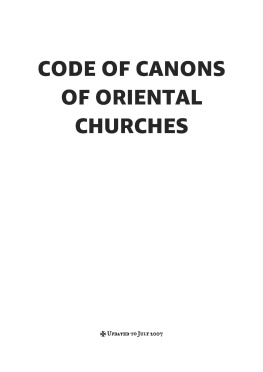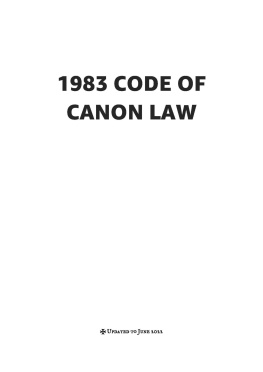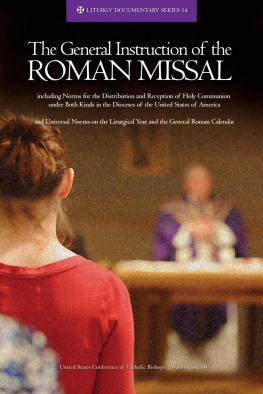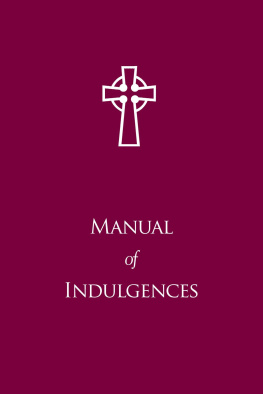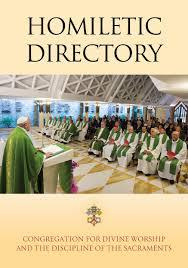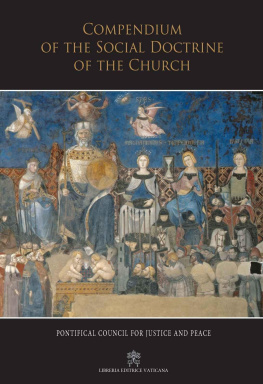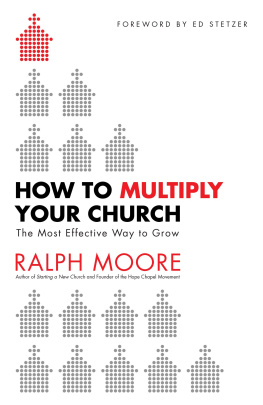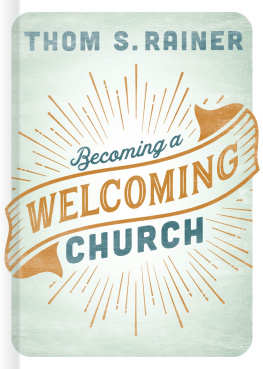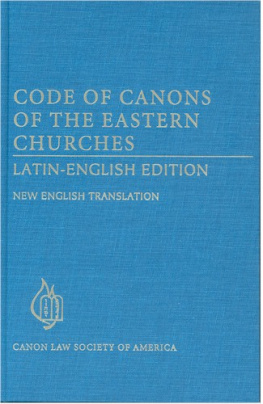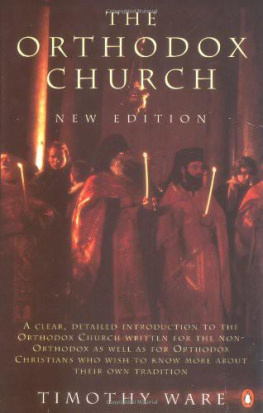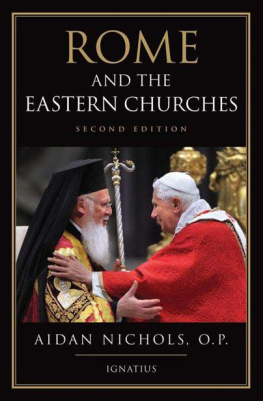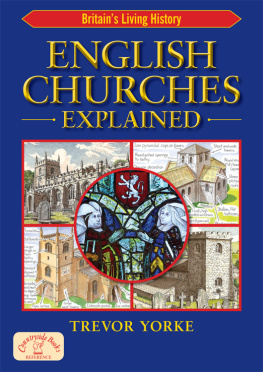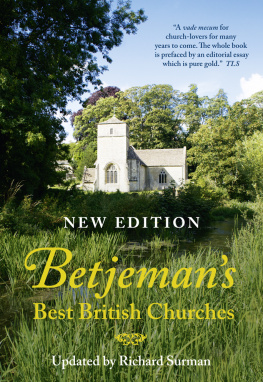The Catholic Church - Code of Canons of Oriental Churches / Code of Canons of the Eastern Churches
Here you can read online The Catholic Church - Code of Canons of Oriental Churches / Code of Canons of the Eastern Churches full text of the book (entire story) in english for free. Download pdf and epub, get meaning, cover and reviews about this ebook. year: 2007, publisher: Vatican, genre: Religion. Description of the work, (preface) as well as reviews are available. Best literature library LitArk.com created for fans of good reading and offers a wide selection of genres:
Romance novel
Science fiction
Adventure
Detective
Science
History
Home and family
Prose
Art
Politics
Computer
Non-fiction
Religion
Business
Children
Humor
Choose a favorite category and find really read worthwhile books. Enjoy immersion in the world of imagination, feel the emotions of the characters or learn something new for yourself, make an fascinating discovery.
- Book:Code of Canons of Oriental Churches / Code of Canons of the Eastern Churches
- Author:
- Publisher:Vatican
- Genre:
- Year:2007
- Rating:5 / 5
- Favourites:Add to favourites
- Your mark:
- 100
- 1
- 2
- 3
- 4
- 5
Code of Canons of Oriental Churches / Code of Canons of the Eastern Churches: summary, description and annotation
We offer to read an annotation, description, summary or preface (depends on what the author of the book "Code of Canons of Oriental Churches / Code of Canons of the Eastern Churches" wrote himself). If you haven't found the necessary information about the book — write in the comments, we will try to find it.
The Catholic Church: author's other books
Who wrote Code of Canons of Oriental Churches / Code of Canons of the Eastern Churches? Find out the surname, the name of the author of the book and a list of all author's works by series.
Code of Canons of Oriental Churches / Code of Canons of the Eastern Churches — read online for free the complete book (whole text) full work
Below is the text of the book, divided by pages. System saving the place of the last page read, allows you to conveniently read the book "Code of Canons of Oriental Churches / Code of Canons of the Eastern Churches" online for free, without having to search again every time where you left off. Put a bookmark, and you can go to the page where you finished reading at any time.
Font size:
Interval:
Bookmark:
Updated to July 2007
Preliminary Canons
Canon 1 - The canons of this Code affect all and solely the Eastern Catholic Churches, unless, with regard to relations with the Latin Church, it is expressly stated otherwise.
Canon 2 - The canons of the Code, in which for the most part the ancient law of the Eastern Churches is received or adapted, are to be assessed mainly according to that law.
Canon 3 - The Code, although it often refers to the prescriptions of liturgical books, does not for the most part legislate on liturgical matters; therefore, these norms are to be diligently observed, unless they are contrary to the canons of the Code.
Canon 4 - The canons of the Code neither abrogate nor derogate from the pacts entered or approved by the Apostolic See with nations or other political societies. They therefore continue in force in their present form not withstanding any prescriptions of the Code to the contrary.
Canon 5 - Acquired rights as well as privileges granted up to this time by the Apostolic See to physical and juridic persons which are in use and have not been revoked remain intact unless they are expressly revoked by the canons of this Code.
Canon 6 - Once this Code goes into effect:
1 all common or particular laws are abrogated, which are contrary to the canons of the Code or which pertain to a matter ex integro regulated in this Code;
2 all customs are revoked which are reprobated by the canons of this Code or which are contrary to them and are neither centenary nor immemorial.
TITLE I. THE RIGHTS AND OBLIGATIONS OF ALL THE CHRISTIAN FAITHFUL
Canon 7 - 1. The Christian faithful are those who, incorporated in Christ through baptism, have been constituted as the people of God; for this reason, since they have become sharers in Christ's priestly, prophetic and royal function in their own manner; they are called, in accordance with the condition proper to each, to exercise the mission which God has entrusted to the Church to fulfill in the world.
2. This Church, constituted and organized as a society in this world, subsists in the Catholic Church, governed by the successor of Peter and the bishops in communion with him.
Canon 8 - In full communion with the Catholic Church on this earth are those baptized persons who are joined with Christ in its visible structure by the bonds of profession of faith, of the sacraments and of ecclesiastical governance.
Canon 9 - 1. Since catechumens are in union with the Church in a special manner, that is, under the influence of the Holy Spirit, they ask to be incorporated into the Church by explicit choice and are therefore united with the Church by that choice just as by a life of faith, hope and charity which they lead; the Church already cherishes them as its own.
2. The Church has special care for catechumens, invites them to lead the evangelical life and introduces them into participation in the Divine Liturgy, the sacraments and the divine praises, and already grants them various prerogatives which are proper to Christians.
Canon 10 - Attached to the Word of God and adhering to the authentic, living magisterium of the Church, the Christian faithful are bound to maintain integrally the faith which was preserved and transmitted at a great price by many and to profess it openly as well as to strive both to understand it better and to make it fruitful in works of charity.
Canon 11 - In virtue of their rebirth in Christ there exists among all the Christian faithful a true equality with regard to dignity and the activity whereby all cooperate in the building up of the Body of Christ in accord with each one's own condition and function.
Canon 12 - 1. The Christian faithful are bound by an obligation in their own patterns of activity always to maintain communion with the Church.
2. They are to fulfill with great diligence the duties which they owe to the universal Church and to their own Church sui iuris.
Canon 13 - All the Christian faithful must make an effort, in accord with each one's own condition, to live a holy life and to promote the growth of the Church and its continual sanctification.
Canon 14 - All the Christian faithful have the right and the obligation of working so that the divine message of salvation may increasingly reach all peoples in every age and in every land.
Canon 15 - 1. The Christian faithful, conscious of their own responsibility, are bound by Christian obedience to follow what the pastors of the Church, as representatives of Christ, declare as teachers of the faith or determine as leaders of the Church.
2. The Christian faithful are free to make known their needs, especially spiritual ones, and their desires to the pastors of the Church.
3. In accord with the knowledge, competence and position which they possess, they have the right and even at times a duty to manifest to the pastors of the Church their opinion on matters which pertain to the good of the Church, and they have a right to make their opinion known to the other Christian faithful, with due regard for the integrity of faith and morals and reverence for the same pastors, and with consideration for the common good and the dignity of persons.
Canon 16 - The Christian faithful have the right to receive assistance from the pastors of the Church from the spiritual goods of the Church, especially the word of God and the sacraments.
Canon 17 - The Christian faithful have the right to worship God according to the prescriptions of their own Church sui iuris, and to follow their own form of spiritual life consonant with the teaching of the Church.
Canon 18 - The Christian faithful are free to found and to govern associations for charitable and religious purposes or for the promotion of the Christian vocation in the world; they are free to hold meetings to pursue these purposes in common.
Canon 19 - All the Christian faithful, since they participate in the mission of the Church, have the right to promote or to sustain apostolic action by their own undertakings in accord with each one's state and condition; however, no undertaking shall assume the name "Catholic" unless the consent of competent ecclesiastical authority is given.
Canon 20 - The Christian faithful since they are called by baptism to lead a life in conformity with the teaching of the gospel, have the right to a Christian education by which they will be properly instructed so as to develop the maturity of a human person and at the same time come to know and live the mystery of salvation.
Canon 21 - Those who are engaged in the sacred disciplines enjoy a lawful freedom of inquiry and of prudently expressing their opinions on matters in which they have expertise, while observing obsequium for the magisterium of the Church.
Canon 22 - All the Christian faithful have the right to be free from any kind of coercion in choosing a state in life.
Canon 23 - No one is permitted to damage unlawfully the good reputation which another person enjoys nor to violate the right of any person to protect his or her own privacy.
Canon 24 - 1. The Christian faithful can legitimately vindicate and defend the rights which they enjoy in the Church before a competent ecclesiastical court in accordance with the norm of law.
2. The Christian faithful also have the right, if they are summoned to judgment by competent authority, to be judged in accordance with the prescriptions of the law to be applied with equity.
3. The Christian faithful have the right not to be punished with Canonical penalties except in accordance with the norm of law.
Canon 25 - 1. The Christian faithful are obliged to assist with the needs of the Church so that the Church has what is necessary for its proper ends, especially for divine worship, for apostolic works and works of charity and for the decent sustenance of ministers.
Font size:
Interval:
Bookmark:
Similar books «Code of Canons of Oriental Churches / Code of Canons of the Eastern Churches»
Look at similar books to Code of Canons of Oriental Churches / Code of Canons of the Eastern Churches. We have selected literature similar in name and meaning in the hope of providing readers with more options to find new, interesting, not yet read works.
Discussion, reviews of the book Code of Canons of Oriental Churches / Code of Canons of the Eastern Churches and just readers' own opinions. Leave your comments, write what you think about the work, its meaning or the main characters. Specify what exactly you liked and what you didn't like, and why you think so.

